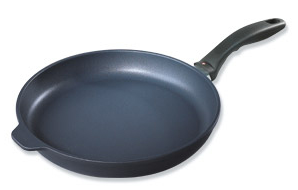
by Larry Magid
My wife and I recently took a drive to Half Moon Bay and visited Toque Blanche, our favorite kitchen store. Like a lot of small merchants, it’s staffed by friendly and knowledgeable salespeople who have picked out some really interesting merchandise that you might not stumble upon online or at big-box stores.

A couple of years ago while visiting the store, I was introduced to Swiss Diamond cookware, which embeds tiny diamond crystals into the surface to create a nonstick pan that works better and lasts longer than the Teflon-type coating used on most nonstick pans. But instead of buying it there, I saved a few dollars by going home and ordering it on Amazon. Not only was it a little cheaper, but at the time, I didn’t have to pay sales tax. Amazon and some other online merchants are now charging sales tax for most items shipped to California.
I love that pan, but I feel a little guilty every time I use it. True, I saved money, but it was the salesperson at Toque Blanche, not anyone at Amazon, who introduced me to the product and described its benefits. And it was a buyer at that store who went to the trouble of stocking it and other cookware so that I could make a side-by-side comparison. But instead of rewarding those efforts, I ripped them off, somewhat, by walking out the door and shopping online.
When we visited the store last weekend, we came across a $150 portable induction burner that we wanted and — naturally — as soon as the salesman turned his back, I used my iPhone to go to Amazon.com, where I learned that the same product could be purchased for $137 with free shipping. But as I was contemplating buying it online, I had a moment of conscience. It struck me that the $13 difference between the store’s price and Amazon’s price shouldn’t be enough to get me to, once again, take unfair advantage of a local merchant.
There’s actually a term for it. It’s called “showrooming,” and — collectively — showroomers are costing local merchants a lot of money.
Amazon even encourages the practice with a smartphone app called Amazon Price Check that lets you scan a product’s bar code or speak the name of the product to find it on Amazon. The app is easy to use in a store, which is one of the reasons that Target in January reportedly sent a letter to its suppliers asking them to create items sold exclusively by the retailer. The letter, signed by Target CEO Gregg Steinhafel, said that the company isn’t willing to “let online-only retailers use our brick-and-mortar stores as a showroom for their products and undercut our prices without making investments, as we do, to proudly display your brands,” according to The Wall Street Journal.
Although I’ve tested it, I’ve never used Amazon’s Price Check app in a store. But I have used RedLaser, which also lets you scan bar codes to find items from multiple online and — in some cases — brick-and-motar merchants. I used RedLaser at Walmart once and found a better price — not from a competitor but from Walmart’s own website. I asked the manager if he could give me that price, but he said no. So I ordered it on the spot and had it shipped for free to that very store.
On Sept. 29, as I was contemplating whether to buy that induction burner at Toque Blanche or order it online, I came up with a win-win solution. I sheepishly showed the screen to the salesperson and asked if he could come close to the online price. He said he couldn’t match it but he could give me a 10 percent discount which, as it turned out, brought the price down to $2 less than Amazon.
Truth be told, I planned to buy it there even if he hadn’t offered me a discount, but I was happy to accept it. He was happy too. The store made a little less on the sale than if I had paid full price, but I’m sure they made something. And I was happy to walk out with the item and the knowledge that some of my money will help the store pay its employees and rent and stay in business so it’s there the next time I need kitchenware.
And, as it turns out, Target has had a change of heart about showrooming. On a company blog, Casey Carl, Target’s president of multichannel, acknowledged that showrooming is “a threat to retailers like Target,” but added that it’s “also the greatest opportunity for retailers.” He said the company is now “fully embracing showrooming,” saying it will “exponentially improve the guest experience.”
That little kitchen store I visited in Half Moon Bay probably doesn’t have a showrooming strategy or a president of multichannel, but it does have me as a happy customer